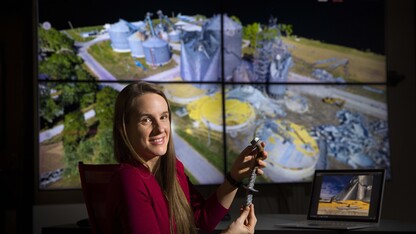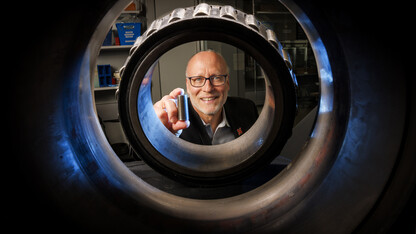· 2 min read
Buchholz joins Biological Process Development Facility as director

Wallace Buchholz has been named director of the Biological Process Development Facility at the UNL College of Engineering.
The BPDF develops processes to manufacture a variety of biological molecules, including vaccines against bio-terror agents such as ricin and anthrax. An ongoing project includes developing a production process and manufacturing a microbicide that will undergo clinical trials to fight HIV in developing countries. The facility has also developed processes to help enable the production of vaccines to protect against some botulism serotypes.
Buchholz arrived in September from Durham, N.C., where he led the Army Research Office microbiology research program for more than six years. At ARO he was responsible for identifying and funding cutting-edge, basic research in microbiology that has relevance to the Department of Defense.
He succeeds Michael Meagher, who was the BPDF’s director since its founding in 1990.
Buchholz earned his Ph.D. in Bacteriology and Public Health/Microbiology from Washington State University with an emphasis in host/pathogen interactions. Prior to working for the Army Research Office, he was a microbiologist/molecular biologist at the Army’s Dugway Proving Ground Life Sciences Test Facility, the Alaska State Public Health Laboratory, the U.S. Fish and Wildlife Service and Texas A&M University.
His work in the past 15 years has focused on bio-defense. Much of Buchholz’s research portfolio at ARO was devoted to microbial adaptation and forensics.
“In essence, microbiology is adaptation,” he said. The more we understand how microbes adapt to their environment, the more we will know how to control and defend against them and thus defend against natural or man-made disease outbreaks.
The BPDF is a phenomenal facility with enormous potential, Buchholz said.
“Among its challenges are integrating its business and educational operations,” he said. “The need for trained personnel to make these specialized biological products in production facilities is growing exponentially.”
Buchholz cited innovative technologies in therapeutics and vaccine production with the potential for enormous impacts on the ability to protect people from known and emerging pathogens.
“I envision ways that the facility can specialize to advance some of these new technologies and transition them from the research bench to clinical trials,” he said.







